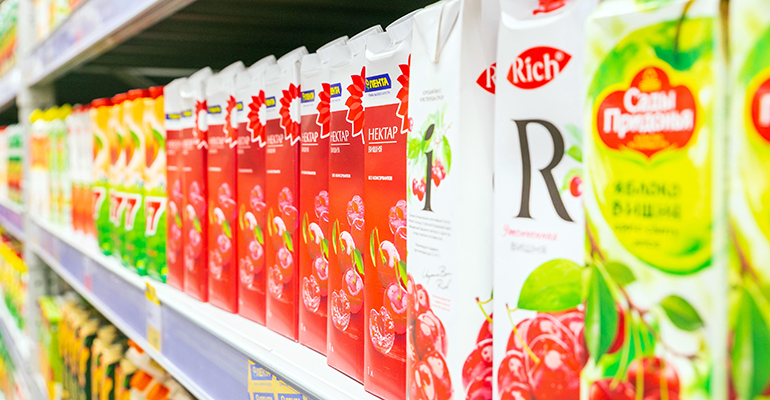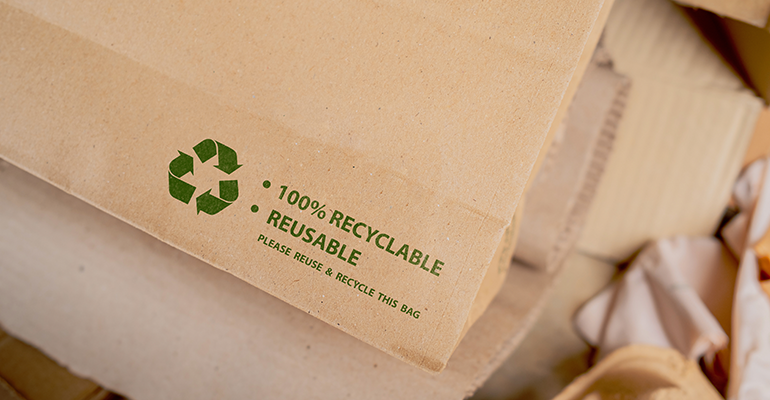Welcome to SJGLE.com! |Register for free|log in
Welcome to SJGLE.com! |Register for free|log in

Related Searches: Tea Vitamin Nutrients Ingredients paper cup packing
One of the current global drivers shaping the food and beverage industry is demand for sustainable packaging as a natural extension to the environmentally friendly food products they encase and protect.

© AdobeStock/tramp51
To help drive the push for responsible aluminium sourcing, the Aluminium Stewardship Initiative (ASI) is working to establish a global standard.
It aims to drive responsible sourcing, processing, and production ensuring greater traceability in the aluminium supply chain.
In May of this year, packaging giant Tetra Pak revealed details of its fully renewable aseptic package that uses a fibre-based material substitute to replac the aluminium layer used in food carton packages.
Even though the layer is thinner than a human hair, it contributes to a third of the green-house gas emissions linked to base materials used by Tetra Pak.
“A first pilot batch of single serve packs featuring this material has been on shelf for a commercial consumer test since early 2022,” said Davide Braghiroli, product director packaging materials, alternative barriers, at Tetra Pak.
“Learnings from tests in the first part of the year have helped to increase the robustness of and confidence in our solutions.
“We have agreed with customers to dedicate more time to this learning phase and kick off the larger scale technology validation around packages with fibre-based barrier in 2023.”
Tetra Pak’s efforts are representative of what the packaging industry is trying to achieve in minimising waste and reducing its carbon footprint.
Its own annual sustainability report details a move towards a 90% collection rate and a 70% effective recycling rate in the European unio by 2030.
In Europe, Directive 94/62/EC outlines recycling and recovery targets, and recommends all EU member states and European Economic Area (EEA) countries – Iceland, Liechtenstein and Norway – countries achieve a target of 60% that includes energy recovery from packaging waste, other forms of recovery and total recycling.
Besides Tetra Pak, Elopak is another firm looking to provide sustainable packaging with its aseptic carton, the Pure-Pak eSense.
Launched in 2021, the packaging removes the aluminium layer, which the firm said reduces the carton’s carbon footprint by 30%, while facilitating full recyclability.
Meanwhile, SIG is another firm addressing its use of aluminium in its aseptic packaging solutions, with January’s launch of its SIGnature Evo, which extends its lower-carbon aluminium-free packaging range already available for plain white milk.
Like Tetra Pak’s latest innovation, the packaging is suitable for oxygen-sensitive products such as fruit juices, nectars, flavoured milk or plant-based beverages.
“Cartons with polymer-based barriers offer good performance when packaging juices and nectars,” explained Braghiroli.
“The one featuring a fibre-based layer is suitable for dairy and similar products, and early results suggest that the shelf life and food protection properties offered by the package are comparable to aseptic carton packages with aluminium.
“However, this needs to be assessed on a case-by-case basis, based on the product itself, the distribution conditions and customer assessment rating.”
 © AdobeStock/Ton Photographer4289
© AdobeStock/Ton Photographer4289
The aluminium component is especially pertinent from an environmental perspective. The recycling capacity of the aluminium component is also lacking on a large scale.
“Both upstream and downstream action is needed to accelerate a progressive change,” said Braghiroli. “Upstream, replacing the aluminium foil with more compatible materials can significantly help.
“Downstream, cross-border collaboration and co-investment with recyclers and industry players are key for expansion at scale.”
Tetra Pak has recently struck a series of partnerships with three European recyclers to address the lack of market demand for the Polymers and Aluminium (PolyAl) components that remain after pulping the fibre content.
“For carton recycling to reach its full potential, we need to expand the value of the recycled materials,” explained Braghiroli.
“The thin layer of polymers, which protects the product from moisture, and aluminium, which protects it from oxygen and light, can be separated and turned into new products, such as roofing tiles, crates, furniture and more.”
One partner, Dutch-based environmental start-up Recon Polymers, has co-developed a solution to convert the extracted plastic and aluminium mix into raw materials for applications in the plastic industry, with the aim to produce 15,000 tons of PolyAl a year.
E-newsletter
Tags